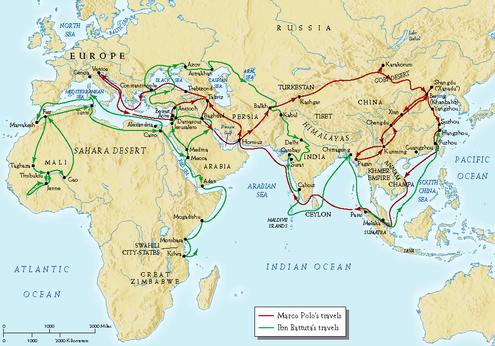WHI-Chap19-ibn-Battuta
Ibn Battuta
Ibn Battuta (1304-1369), born in Fez, Morocco, was a Muslim traveler who journeyed to many of the Muslim (and some non-Muslim) lands to seek employment as a qadi, all the while keeping records of his travels. He traveled to India, the Maldive Islands, the Swahili city-states, and the Mali Empire, among many other places. In 1331, he traveled to the Swahili city states, and upon visiting Kilwa, Ibn Battuta reported that local rulers consulted regularly with Muslim scholars from Persia and Arabia. He also visited Mogadishu in the same year and praised it highly, also describing the local customs and rituals and his warm welcome by the local Sultan (T&E p. 495, source document). During his visit to sub-Saharan Africa from 1351-1352, Ibn Battuta was angered by the actions of women, who would walk in public wearing only a loincloth and would talk casually with men who were not their husbands. Ibn Battuta’s records on Swahili and sub-Saharan cultures are crucial writings that describe local traditions and day-to-day life, the influences of native African religions on African Islam, and the extent of wealth and sophistication in fourteenth-century African societies.

Page created by: Pranav Bhamidipati
Return to WHI-Second Semester